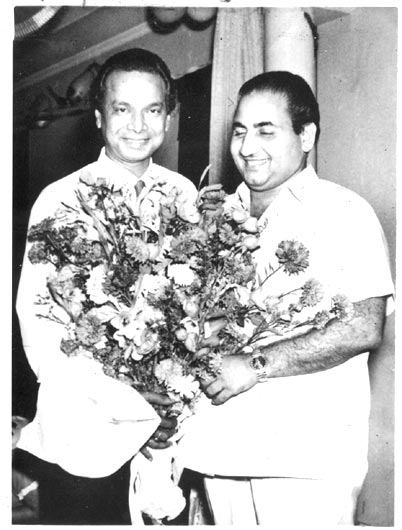Naushad Ali: The Soul Behind Hindi Cinema’s Golden Melodies
In the corridors of Indian film music, few names echo with as much grace and reverence as Naushad Ali. A composer, a visionary, and a cultural bridge between classical heritage and cinematic expression—Naushad was not just a music director; he was a magician of melodies.
🎼 Humble Beginnings, Musical Destiny
Naushad was born on December 25, 1919, in Lucknow, a city steeped in poetry, etiquette, and musical tradition. From a young age, he was drawn to the soulful strains of Indian classical music. Against family wishes, he left home and journeyed to Mumbai to pursue music—not with money, but with unmatched passion.
Sleeping on studio floors and assisting composers, he finally got his break with the film "Prem Nagar" (1940). But it was "Rattan" (1944) that turned him into a household name. The soundtrack was a massive hit, and suddenly, Hindi cinema had found its musical maestro.
🎬 Naushad’s Signature: Classical Meets Cinema
What set Naushad apart was his fearless integration of Indian classical ragas with popular film tunes. At a time when most composers leaned towards folk or western styles, he brought in dhrupad, khayal, thumri, and qawwali—all wrapped in orchestration that the masses could appreciate.
His most iconic works include:
- Baiju Bawra (1952) – A milestone film that turned classical music into a blockbuster element.
- Mughal-e-Azam (1960) – A musical and cinematic epic, with the timeless "Pyar Kiya To Darna Kya".
- Mother India (1957) – Patriotic, poignant, and powerful in every note.
- Andaz (1949) and Dil Lagi (1949) – Demonstrating his lyrical sensibility and innovation.
🎤 Champion of Voices
Naushad didn’t just compose music; he sculpted soundscapes around voices. He was instrumental in promoting legends like:
- Mohammed Rafi – whom he called "voice of the soul"
- Suraiya and Shamshad Begum – whose early careers he elevated
- Lata Mangeshkar – whose ethereal voice he used with delicate mastery
He even trained actors like Dilip Kumar in sur and taal to enhance their on-screen performance of songs.
🏆 A Life of Accolades and Reverence
Naushad's music was not only admired—it was honored across generations. He was awarded:
- Padma Bhushan in 1992
- Dadasaheb Phalke Award in 1981
- Sangeet Natak Akademi Award
He composed for over 65 films, yet his quality never wavered. Each note bore his signature—elegant, expressive, eternal.
🕊️ The Gentle Maestro
Despite his fame, Naushad remained a humble artist. He never chased trends. Even when the music scene shifted to disco and pop in the 1980s, he stayed loyal to his classical roots. His last film, "Taj Mahal: An Eternal Love Story" (2005), released after his death, was a fitting farewell—a return to the soul of melody.
Naushad Ali passed away on May 5, 2006. But in every tabla beat and tanpura strum of golden-era songs, his spirit lives on.
🎶 The Legacy of Naushad
Naushad taught us that music need not shout to be heard—it can whisper and still echo forever. His compositions weren't just songs; they were stories set to rhythm, emotions carved in sound.
Which Naushad composition gives you goosebumps? Share your thoughts and memories in the comments. Let’s keep the melody alive. 🎻
Tags: #NaushadAli, #GoldenEraBollywood, #HindiFilmMusic, #ClassicalComposer, #MusicalLegends







